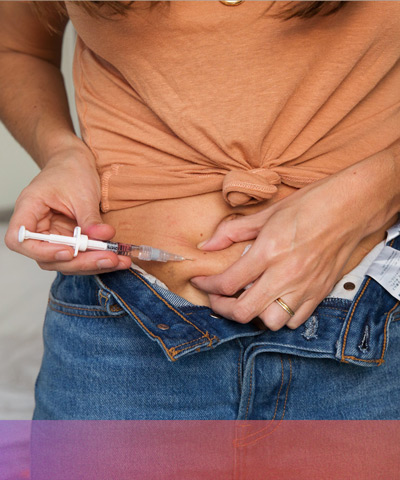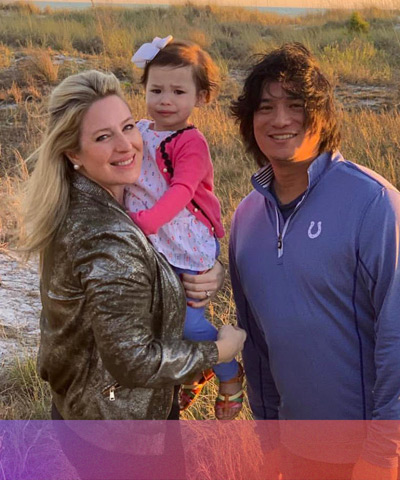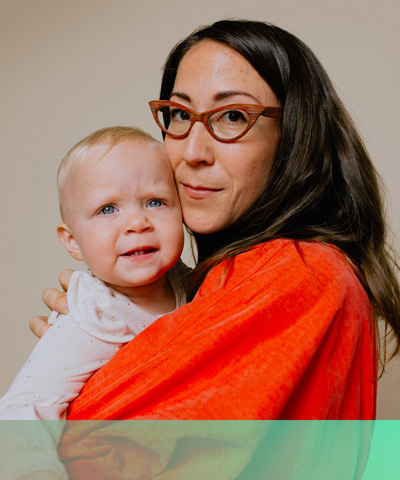I’m 31, Have Unexplained Infertility, And IVF Only Cost Me $300. This Is My Fertility Diary
Welcome to Refinery29’s Fertility Diaries, where people chronicle their joyous, painful, and sometimes complicated paths to parenthood.
History: I just turned 31. My birthday marked two full years of trying to get pregnant; the first year we didn’t think to seek medical help and this year has been packed with doctors appointments, blood tests, and disappointments.
History: I just turned 31. My birthday marked two full years of trying to get pregnant; the first year we didn’t think to seek medical help and this year has been packed with doctors appointments, blood tests, and disappointments.
When we first decided to see a specialist, I was still 29 and couldn’t get a referral to an in-network doctor until I turned 30. You bet I called them on my birthday. Little did I know that it would take three months to get our first consult with an IVF doctor, and another month full of tests to come up with a plan.
AdvertisementADVERTISEMENT
In the end, I was diagnosed with unexplained infertility. There’s no good reason why I can’t get pregnant. The bright spot in all this is that our insurance covers almost all the costs.
Age: 31
Location: Boston, MA
Occupation: Financial Analyst
Household Income: $175,000
Location: Boston, MA
Occupation: Financial Analyst
Household Income: $175,000
June 11, 2019
Follow up with IVF doctor after three failed IUIs
The last time we met with our IVF specialist was earlier this year when we first discussed “the plan.” First, we’d try IUI — the turkey baster method — which involves inserting my husband’s sperm into my uterus via a catheter. My husband’s insurance approved three rounds, and all of them failed.
Today, we’re meeting with our doctor to assess our next steps. She says we could try another round of IUI, but after the failed attempts, she advises against it. We decide to start prepping for IVF. I’m currently on my period, and we still need my husband’s insurance to approve it, so we’ll lose another month before we can get started.
I’m prescribed birth control for when my next cycle starts. My doctor tells me it’ll help me start with “a clean slate,” so to speak. The last time I took the pill was over a year ago, so I keep forgetting to take it, causing a month of spotting.
Follow up with IVF doctor after three failed IUIs
The last time we met with our IVF specialist was earlier this year when we first discussed “the plan.” First, we’d try IUI — the turkey baster method — which involves inserting my husband’s sperm into my uterus via a catheter. My husband’s insurance approved three rounds, and all of them failed.
Today, we’re meeting with our doctor to assess our next steps. She says we could try another round of IUI, but after the failed attempts, she advises against it. We decide to start prepping for IVF. I’m currently on my period, and we still need my husband’s insurance to approve it, so we’ll lose another month before we can get started.
I’m prescribed birth control for when my next cycle starts. My doctor tells me it’ll help me start with “a clean slate,” so to speak. The last time I took the pill was over a year ago, so I keep forgetting to take it, causing a month of spotting.
Cost: $15 co-pay for meeting with the specialist. The pill was covered through insurance and I already had pads on hand.
August 3, 2019
Day three of cycle, baseline ultrasound
Day three of cycle, baseline ultrasound
Day three of my cycle after birth control marks the beginning of almost daily ultrasounds, blood tests, and injections. All this poking and prodding will determine the size of the ovaries, my uterine lining, how the eggs are growing, and my estrogen levels.
AdvertisementADVERTISEMENT
I had received daily injections of Gonal-F with my previous IUIs, but IVF requires two additional needle pokes. Lupron in the morning and Menopur in the evenings. Lupron "shuts down" the reproductive system, Gonal-F (or FSH) stimulates follicle growth, and Menopur stimulates the development of multiple eggs. Luckily my husband volunteers (read: is forced) to administer the injections. He watches some training videos and quickly becomes a champ at stabbing me multiple times, twice a day.
The nurse warned me that my ovaries would expand to the size of grapefruits. She wasn’t lying, I can’t sleep on my side, bend, twist, or even button my pants by the end of the week. I attempt to continue my regular workout schedule, but can’t bend forward. That means no ab workouts, and I’m way slower during HIIT classes.
I go in on the morning of Aug. 8, 9, 10, and 12 for quick check ups. Each appointment consists of a transvaginal ultrasound that tracks the growth and size of my follicles and uterine lining, and a blood test that determines my estrogen levels. On the 12, I get a call from the nurse. She says everything looks good and I should stop all other injections and take the hCG (human chorionic gonadotropin) shot, which triggers ovulation. I’m scheduled for the egg retrieval on the morning of August 14.
Cost: $160 for all the IVF medication, syringes, alcohol swabs, and disposal kit. The amount is negligible compared to what we would have had to pay, about $2,500 to $3,000, without our insurance coverage.
AdvertisementADVERTISEMENT
August 14, 2019
Egg retrieval
Egg retrieval
I call out sick from work, as I haven’t told my boss what I’m going through. I just started at this company and don’t feel comfortable talking about personal things.
My husband delivers his sperm sample. I get called into a back room to prep for the OR. This is my first experience with any type of surgery, so the entire routine is new to me. I get into the hospital gown, meet the anesthesiologist, and sign papers. I’m admitted into the surgery room and meet the IVF doctor that’s on call for the procedure. He’s not my regular doctor, and this makes me feel a little uneasy. The procedure itself entails the doctor taking a long needle and inserting it through the vagina and into the follicles to extract the eggs with suction at the end of the needle. I go under and the next thing I know I’m being wheeled back into the recovery room.
The pain is so intense that I immediately start crying. The nurse already put heat packs on my abdomen area, but adds more. She hands me some Tylenol. As I’m recovering, I find out that 14 eggs were retrieved. I feel a small bit of joy in that, as I lie there suffering. After about half an hour, I can finally sit up, dress, and hobble home.
We’re told that we’ll receive a call the next day to find out what day the transfer will take place, and how many eggs were successfully fertilized.
AdvertisementADVERTISEMENT
I stay home from work the next day, too. Although the pain is manageable, I’m still downing Tylenol, Gatorade, and ginger ale, and I’m saddled with heat packs.
The doctor tells us that we’ll be doing a day five transfer with one of our embryos. The doctor decides how many days after the egg retrieval the transfer will take place, depending on how the embryos are growing and how the patient's body responded to the IVF medications. I start the dreaded progesterone injections that night, which help thicken the uterine lining so that the embryo has a better chance of attaching. The needle is big, the liquid is thick, and I can feel it starting to bruise.
Cost: $0, the retrieval was fully covered by insurance.
August 18, 2019
Embryo transfer
Embryo transfer
We’re back at the hospital for the long awaited transfer. We traveled to California for a wedding over the weekend. Luckily, there wasn’t much movement required for that. At one point during the weekend, my smartwatch told me my resting heart rate was 100, which is way out of range for me. This scared me. Was I doing something wrong? Would this affect the transfer in anyway?
The morning of the transfer, my doctor tells me I have to drink at least 32 oz. of water. A full bladder will push against my uterus, making visibility and access easier. My husband is suited up and is allowed in the OR.
We’re back in the same room where the egg retrieval took place, except this time I’m not given anesthesia. It’s supposed to be a painless operation. The doctor inserts the embryo via catheter into my uterus. The room is fairly small, and it’s the doctor, ultrasound tech nurse, the embryologist, my husband, and me. I’m up on the table with my legs splayed out. We’re shown a picture of the embryo that will be transferred. The doctor inserts a speculum in my vagina, and the tech has a probe pressed against my abdomen so that the doctor can see what he’s doing.
AdvertisementADVERTISEMENT
All told, it’s very uncomfortable. I’m wincing the whole time. My hands are clenched because the doctor can’t find a straight path to my uterus with the catheter. Frankly, there’s a lot of moving around down there. Plus, I guzzled so much water and the tech is pressing against me. My husband looks like he’s feeling helpless and keeps asking if I’m okay. We both try to pay attention to the ultrasound screen, but have no idea what we’re looking at. After the doctor successfully gets the catheter in place, an embryologist brings in the embryo and the doctor inserts it. Whew.
I sit up immediately and am sent on my way. As we exit the OR, the tech hands me an ultrasound picture of the embryo at the time of insertion. Seeing that black and white blob on a piece of film gives me so much hope. It’s surreal and all I can think is: That could be my baby.
We’ve been focusing all our energy on this one embryo that we just implanted, but now it’s time to think about the rest of the eggs from the retrieval. Before we started the IVF cycle we had to make some decisions about the embryos we wouldn’t implant right away. My husband and I opted out of genetically testing them for any abnormalities. We then decided to freeze any viable ones. Of the 14 eggs retrieved, a total of two, including the one we just transferred, were successfully fertilized and turned into viable embryos that we could use.
AdvertisementADVERTISEMENT
The rest didn’t make it.
Now, we only have one frozen embryo left. And if the transfer I just did fails, we’ll only have one more chance to do another transfer without having to go through the entire egg retrieval process again. I’m pretty devastated by this. I’ve gone through so much with all the injections and hormones being pumped into me. I feel gutted. How could I have gone through that painful process to only come out with two embryos?
Cost: $15, because it’s covered by insurance, but there’s a co-pay for the transfer procedure.
August 19 to 30, 2019
Two week wait
Two week wait
Time for the dreaded two week wait between the transfer and a pregnancy test. It takes at least that long for any of the injected hCG to fully leave your system. If you take a pregnancy test right after the transfer, there’s a high chance it’ll be a false positive because of the hormones. There’s also a chance of a false negative with a home testing kit, because the kit may not pick up trace amounts of the pregnancy hormone in urine. So we wait. Every morning I see that small ultrasound picture of the embryo. I hope and pray that it implanted.
Everything I’ve read on the internet and heard from other people is true. You really do analyze every single twinge, cramp, and thing your body does during those two weeks. I left the transfer with such high hopes. I feel that it’s a done deal and I’ll for sure be pregnant. I’m itching to take a pregnancy test almost every moment. I don’t resume my workouts because I've been advised against lifting, jumping, and running. My ovaries are still pretty enlarged at this point, so twisting and bending are painful. During the second week, I start estrogen patches and start to feel PMS symptoms come on. I turn to the Internet and obsessively check if each symptom could be a sign of early pregnancy.
AdvertisementADVERTISEMENT
Cost: $0, the patches were included with the batch of IVF meds we got at the beginning of the process.
August 30, 2019
Blood test to determine pregnancy
Blood test to determine pregnancy
It’s the big day. We’ll find out whether all the medications, injections, pain and waiting worked. I go in for a blood test at 8 a.m. and head to work. Around noon I see the email with the results, but am too nervous to look. I end up leaving work early so I can have my husband check.
We open the email together and see it: hCG <6. If hCG levels are equal to or more than six, it means pregnancy. Less than six means there was not enough of the hCG hormone detected to determine pregnancy.
My heart drops and the tears start rolling immediately. I was so sure it would work.
All I can think is: What did I do wrong? What could I have done differently for a better outcome? Will I even have another chance? What’s wrong with me? Why can’t I make this work? It truly felt like I lost something. The failed IUIs didn’t hurt the same way that the failed IVF did.
The biggest question is: What now?
The doctor’s office eventually calls, and tells me what I already know. Not pregnant. Honestly, I’m crying too hard to hear anything else she says.
I’ve read blog posts and articles about how IVF went for other people. They all talk about the doctor visits, injections, and ultrasounds. I haven’t read about what happens when it fails. When do I get my period? Is it going to be the same or heavier? How long should I expect it to last? When will the bloating go down? More importantly, when do I get to try again? Will it even work?
AdvertisementADVERTISEMENT
In my case, I get my period four days after the negative blood test. TMI, it’s clumpy. I believe that’s because my uterine lining was thicker than normal. Otherwise, it’s pretty much the same as my regular periods. My PMS symptoms are the same: Cramps, backache, and moodiness.
We go back to the doctor this week to find out next steps, and if insurance will approve transferring our last embryo. I’ve been endlessly researching how to better my chances for next time. I’ve read the stats on frozen versus fresh embryo transfers. I’ve made an appointment for acupuncture, which I hear can help. I’ve ordered books on what type of lifestyle changes I can make. I’m willing to try anything and everything for the next round to go well.
This is the hardest part of my story to share. The rest is clinical, but this is emotional.
Cost: $0
September 15
Trying again.
Trying again.
I recently had a follow up appointment with my IVF doctor, and we decided to use the only other frozen embryo we had for the next cycle. She says she’s only slightly concerned that we got two embryos from 14 eggs. She shows me my chart and explains that there were about six eggs that were mature enough to be fertilized. The other eight were too small to make it. I also learn that the embryos are graded by quality.
The one that was transferred was good but not of the highest quality. The remaining one is a little below that. She tries to console me. She says this failed cycle helps you know for next time — if there is a next time — what to do better and differently.
AdvertisementADVERTISEMENT
Honestly, that isn’t what I want to hear. I want to know what exactly went wrong and what I can do to make the next one successful. I don’t want to think what will happen if this next transfer fails. We’ll start that next month. At least there’s no egg retrieval this time. But if the transfer fails, we’ll have to go through the entire process all over again.
On the third day of my cycle, I’ll go in for a baseline ultrasound and blood test. I’ll repeat this on day 10. Then if all is well I’ll take an injection to stimulate ovulation and have the transfer scheduled for the following week.
I’ve read that acupuncture can help with fertility, so I’ve decided to try it. I’ve gone in for two appointments so far. My acupuncturist seems quite understanding, but I haven’t noticed a difference yet. I’ve heard it takes three months of acupuncture and proper eating to actually see a change. My next transfer will take place just about a month into the acupuncture, but I’m hoping that’ll be good enough.
My acupuncturist also recommended a diet change and some stuff I should try at home (for example, using a heating pad to warm my feet and belly area every night). I ditch my regular smoothie at breakfast for oatmeal. I switch out my normal salad lunch for warm root vegetables and baked chicken. Changing my diet wasn’t as hard as I thought it would be, but it’s only been a week.
AdvertisementADVERTISEMENT
Cost: I have a $15 copay for the IVF followup. For first-timers it’s $60 for acupuncture plus a $15 copay. There’s also a $15 copay for the followup acupuncture appointment.
Total Costs: $300
Reflection: I have a lot of questions about this process: Am I doing the right thing? Should I continue down this path? Should I just drop the meds and doctors and hospital visits and let nature run its course? Am I being selfish to try so aggressively at the age of 30?
Should I publicize what I’m going through? That’s another big one. Up until now, only my parents and my husband’s parents have been aware of our struggles. I haven’t told any of my friends or siblings. Would sharing help me? Or will this feeling of failure only get worse? I struggle with these questions almost daily. The only conclusion that I’ve come to is this: If this next transfer fails, I’ll take a break and reassess.
The fact that my husband’s insurance has covered basically all the costs of this journey is a huge blessing. If it wasn’t covered, we would have had to shell out over $20,000 for the procedure, not counting the meds. We definitely would have hesitated to go through IVF at this stage without insurance. I think we would have tried to conceive naturally for longer than one year, and if we did eventually get to IVF (without insurance), we definitely would have considered an independent clinic.
We’re also fortunate that we could have asked our parents to lend us money for the cycle, but would have been hesitant to ask again if the cycle failed.
Have your own Fertility Diary to share? Contact us, here.
DESIGN AND ART DIRECTION ANDREINA CARRILLO. ANIMATION BY MISHA TOWNSEND.
AdvertisementADVERTISEMENT












